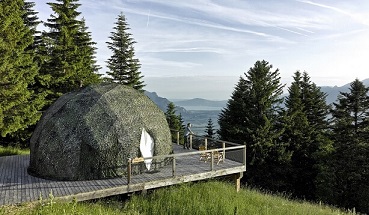 AMSTERDAM—To celebrate Earth Day on April 22, Booking.com, a global leader in connecting travelers with the widest choice of places to stay, released the findings from its most recent global Sustainable Travel Report.*
AMSTERDAM—To celebrate Earth Day on April 22, Booking.com, a global leader in connecting travelers with the widest choice of places to stay, released the findings from its most recent global Sustainable Travel Report.*
The report indicates that the green travel trend continues to gain momentum with a large majority of global travelers (87 percent) stating that they want to travel sustainably, and nearly four in 10 (39 percent) confirming that they often or always manage to do so. However, 48 percent indicate they never, rarely or only sometimes manage to travel sustainably, suggesting that while promising strides are being made for a greener future, there is still plenty of room to turn intentions into action.
Sustainability Starts Where You Stay
“Sustainable travel” is a subjective term that has different connotations for different people. However, for almost half of travelers (46 percent), “sustainable travel” means staying in eco-friendly or green accommodations, topping the list of what people think of when hearing the term. The top reasons travelers give for choosing these eco-friendly places to rest their heads are to help reduce environmental impact (40 percent), to have a locally relevant experience (34 percent) and wanting to feel good about an accommodation choice (33 percent).**
Looking ahead, more than two-thirds (68 percent) of travelers intend to stay in an eco-accommodation in 2018, reassuringly up from 65 percent in 2017 and 62 percent in 2016. Additionally, the percentage of travelers who have not considered eco-friendly stays because they were unaware of their existence continues to decline, resting at 31 percent this year, compared to 39 percent and 38 percent in 2017 and 2016 respectively.***
Eco-Inspiration
When it comes to what inspires people to travel more sustainably, it seems that travel itself is the biggest motivator. Six in ten (60 percent) travelers indicated that they found the impressive natural sights visited on past travels as their inspiration to travel more sustainably, while more than half (54 percent) said seeing the visible impact that tourism can have on destinations serves as their inspiration.
Overcoming Eco-Barriers
While perceived extra cost remains the top barrier for travelers wanting to travel more sustainably, two-thirds (67 percent) of travelers would be willing to spend at least 5 percent more on their travel to ensure it was as low impact on the environment as possible. Indian travelers claim to be the most willing, with nearly a third (32 percent) declaring that they would pay 15 percent or more, followed by Brazilians (21 percent) and Chinese (18 percent).
The research also indicates that a lack of information and a lack of credible certification poses a significant obstacle to sustainable travel (32 percent), particularly in India, China and Japan where travelers cited this as even more of a barrier than extra cost.
As sustainable travel intentions grow, travelers are still looking for ways to more easily fulfil these ambitions. Forty percent said that online booking sites offering a sustainable or eco-friendly filter option would help, while 32 percent continue to call for an international standard for identifying eco-friendly accommodations.
As part of its commitment to improving ways to uncover and share the sustainability efforts of its own accommodation partners, Booking.com is partnering with organizations like Green Key, an internationally recognized eco-label with strict award criteria that honors positive environmental management, to highlight Green Key awarded properties as “sustainable” on its site.
It’s Good to Go Green
Proving too that sustainability measures don’t need to come at an inconvenience, many global travelers indicated they engage in sustainable travel behavior because the activity itself adds a positive vacation experience to their trip.
“As travelers increasingly look to explore and experience the world in a sustainable way, we continue to look at ways that we can help make it even easier for them to do that, whether by highlighting eco-friendly properties or enabling people to filter their search results on Booking.com based on proximity to an electric vehicle charging station,” says Pepijn Rijvers, Senior Vice President and Chief Marketing Officer at Booking.com. “Meaningful change can only come about through collaboration on multiple fronts throughout the entire sustainable tourism ecosystem. That’s why we also look to foster innovation in the sustainable tourism space through our Booking Booster initiatives to fund and support remarkable startups and change makers in this area. Today’s research reaffirms that sustainable travel is within reach for all of us, which is encouraging as we together strive to make a positive impact for a more sustainable future.”
Methodology
*Research commissioned by Booking.com and independently conducted among a sample of adults who have taken a trip in the last 12 months/plan to take a trip in the next 12 months. In total 12,134 respondents were surveyed across 12 markets (1,000+ from Australia, Brazil, Canada, China, Germany, France, India, Italy, Japan, Spain, the United Kingdom and the United States). Respondents completed an online survey in February and March 2018.
**These percentages pertain to the 4,768 respondents who actually stayed in eco-friendly accommodation at least once in 2017.
***This is the third year in which the Booking.com Sustainable Travel survey has been held. While the methodology and a set of core questions has remained the same, some additional questions were added and the sample has expanded over the years. For the 2017 edition, 11,069 respondents were surveyed (1,000+ from the above countries except India, which was first added in 2018). For the 2016 edition, a total of 10,025 respondents were surveyed (1,000+ from the above countries except Spain, France and India, but including New Zealand.)






